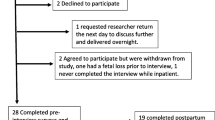Abstract
Women with chronic medical conditions are at increased risk for pregnancy-related complications, yet little research has addressed how women with diabetes, hypertension, and obesity perceive their pregnancy-associated risks or make reproductive health decisions. Focus groups were conducted with 72 non-pregnant women stratified by chronic condition (diabetes, hypertension, obesity) and by previous live birth. Participants discussed their intention for future pregnancy, preconception health optimization, perceived risk of adverse pregnancy outcomes, and contraceptive beliefs. Four major themes were identified, with some variation across medical conditions and parity: (1) Knowledge about pregnancy risks related to chronic medical conditions was limited; (2) Pregnancy intentions were affected by diabetes and hypertension, (3) Knowledge about optimizing preconception health was limited; and (4) Lack of control over ability to avoid unintended pregnancy, including limited knowledge about how medical conditions might affect contraceptive choices. Women with diabetes and hypertension, but not obesity, were generally aware of increased risk for pregnancy complications, and often expressed less intention for future pregnancy as a result. However, diabetic and hypertensive women had little knowledge about the specific complications they were at risk for, even among those who had previously experienced pregnancy complications. Neither chronic condition nor perceived risk ensured intent to engage in preconception health promotion. We observed knowledge deficits about pregnancy-related risks in women with diabetes, hypertension, and obesity, as well as lack of intent to engage in preconception health promotion and pregnancy planning. These findings have important implications for the development of preconception care for women with chronic medical conditions.
Similar content being viewed by others
References
Institute of Medicine. (1995). In S. Brown & L. Eisenberg (eds.), The best intentions: Unintended pregnancy and the well-being of children and families. Washington, DC: National Academy Press.
Dunlop, A. L., Jack, B. W., Bottalico, J. N., Lu, M. C., James, A., Shellhaas, C. S., et al. (2008). The clinical content of preconception care: Women with chronic medical conditions. American Journal of Obstetrics and Gynecology, 199, S310–S327.
Bitto, A., Gray, R. H., Simpson, J. L., Queenan, J. T., Kambic, R. T., Perez, A., et al. (1997). Adverse outcomes of planned and unplanned pregnancies among users of natural family planning: A prospective study. American Journal of Public Health, 87, 338–343.
Holing, E. V., Beyer, C. S., Brown, Z. A., & Connell, F. A. (1998). Why don’t women with diabetes plan their pregnancies? Diabetes Care, 21, 889–895.
James, P. J., Younger, M. D., Hamilton, B. D., & Waisbren, S. E. (1993). Unplanned pregnancies in young women with diabetes. An analysis of psychosocial factors. Diabetes Care, 16, 1572–1578.
Chuang, C. H., Chase, G. A., Bensyl, D. M., & Weisman, C. S. (2005). Contraceptive use by diabetic and obese women. Womens Health Issues, 15, 167–173.
Vahratian, A., Barber, J. S., Lawrence, J. M., & Kim, C. (2009). Family-planning practices among women with diabetes and overweight and obese women in the 2002 National Survey for Family Growth. Diabetes Care, 32, 1026–1031.
Kitzmiller, J. L., Buchanan, T. A., Kjos, S., Combs, C. A., & Ratner, R. E. (1996). Pre-conception care of diabetes, congenital malformations, and spontaneous abortions. Diabetes Care, 19, 514–541.
Casson, I. F., Clarke, C. A., Howard, C. V., McKendrick, O., Pennycook, S., Pharoah, P. O., et al. (1997). Outcomes of pregnancy in insulin dependent diabetic women: Results of a five year population cohort study. BMJ, 315, 275–278.
Roberts, J. M., Pearson, G., Cutler, J., & Lindheimer, M. (2003). Summary of the NHLBI Working Group on research on hypertension during pregnancy. Hypertension, 41, 437–445.
Stothard, K. J., Tennant, P. W., Bell, R., & Rankin, J. (2009). Maternal overweight and obesity and the risk of congenital anomalies: A systematic review and meta-analysis. JAMA, 301, 636–650.
Jensen, D. M., Damm, P., Sorensen, B., Molsted-Pedersen, L., Westergaard, J. G., Ovesen, P., et al. (2003). Pregnancy outcome and prepregnancy body mass index in 2459 glucose-tolerant Danish women. American Journal of Obstetrics and Gynecology, 189, 239–244.
Weiss, J. L., Malone, F. D., Emig, D., Ball, R. H., Nyberg, D. A., Comstock, C. H., et al. (2004). Obesity, obstetric complications and cesarean delivery rate—A population-based screening study. American Journal of Obstetrics and Gynecology, 190, 1091–1097.
Corbin, J., & Strauss, A. (1990). Grounded theory research: procedures, canons, and evaluative criteria. Qualitative Sociology, 13, 3–21.
Centers for Disease Control, Prevention. (2006). Recommendations to improve preconceptional health and health care—United States: A report of the CDC/ATSDR Preconception Care Work Group and the Select Panel on Preconception Care. MMWR, 55, 1–22.
American College of Obstetricians and Gynecologists. (2006). Use of hormonal contraception in women with coexisting medical conditions. ACOG Practice Bulletin. Washington, DC: American College of Obstetricians and Gynecologists (ACOG).
Acknowledgments
We would like to thank Janet Baker, Frani Battista, and Lisa White from the Penn State Survey Research Center for their contributions to conducting the focus groups; Dr. Robert Gabbay, Scott Mincemoyer, and Lorraine Mulfinger for providing access to the Penn State Institute for Diabetes and Obesity’s volunteer research registry; and Drs. Kristen Kjerulff, John Botti, Richard Legro (Penn State Hershey), Dr. Nancy Landale (Penn State University), and Dr. Brian Jack (Boston University) for their contributions to design of the focus group questions. This study was funded in part by the National Institute for Child Health and Human Development (HD051634).
Author information
Authors and Affiliations
Corresponding author
Rights and permissions
About this article
Cite this article
Chuang, C.H., Velott, D.L. & Weisman, C.S. Exploring Knowledge and Attitudes Related to Pregnancy and Preconception Health in Women with Chronic Medical Conditions. Matern Child Health J 14, 713–719 (2010). https://doi.org/10.1007/s10995-009-0518-6
Published:
Issue Date:
DOI: https://doi.org/10.1007/s10995-009-0518-6




